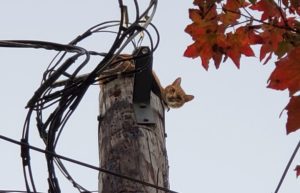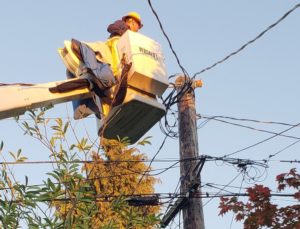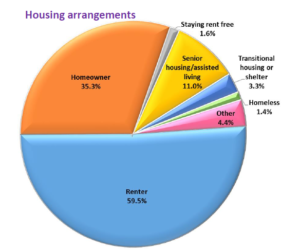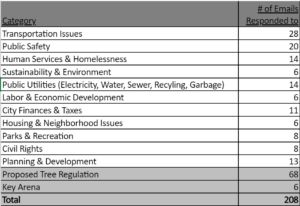Everyone Doing Their Part to Rescue Bernard the Cat
We’ve all heard the story before – a cat gets stuck up a tree and the local fire fighters come to the rescue to bring the cat down. In this case it was a utility pole and an adorable orange and white cat named Bernard, or as he’s affectionately known, Tubby. Unfortunately, the fire fighters were unable to perform their rescue due to high-voltage wires atop the utility pole.
We’re not sure why, but Bernard’s Friday morning started out on top of this utility pole, 40 feet up, in the West Seattle Junction. Bernard’s owner, Abi was concerned because he hadn’t come home the night before, so in the morning she went in search of him and found him meowing on the utility pole.

Abi reached out to the police and fire departments, as well as animal control, all unable to assist because of the high-voltage wires. City Light had sent a crew out, but they didn’t have the proper equipment to reach the top of the 40-foot pole. Later quoted in the Seattle Times, Abi said “There was a lot of back and forth — no one was agreeing to do anything. It was sort of like everybody was pointing fingers at everybody else.” So, a political friend suggested contacting her local City Councilmember, me. I received an email shortly after 5:30pm on Friday, and Alex, my staff member who saw the email, promptly sent an email to our Council liaison at City Light.
I can’t say for sure that City Light jumped into action after the email, but about an hour later I received word that City Light had sent a truck out and was able to rescue Bernard. I do know one thing, harkening back to my days as a neighborhood organizer, the squeaky wheel gets the grease.

I’m happy to say that Bernard is now safely home, and I want to extend my thanks to all the City staff involved in helping in the rescue as well as the neighbors, and especially Abi for your patience with the system. While it’s a litte unusual for Councilmembers to get involved in situations like this, I was very happy to play a small part.
Seattle Rainbow Housing Report- Aging In Community: Addressing LGBTQ Inequities in Housing and Senior Services
On Tuesday September 25, 2018 I, along with Mayor Durkan, Councilmember Gonzalez, and King County Councilmember Joe McDermott, spoke at the release event for the new report Aging in Community: Addressing Inequities in LGBTQ Housing and Senior Services. This project was funded by the Seattle City Council under Councilmember Lorena Gonzalez’ leadership and commissioned by the City of Seattle Office of Housing (OH) to examine the needs of LGBTQ older adults.
One of the reasons that the Council funded the study was to encourage OH to act on specific direction that the Council gave back in 2016, but still hasn’t been acted on. In April of 2016, the Council passed legislation that put the 2017 Housing Levy on the November 2016 ballot. The legislation required that the Office of Housing consider prioritizing specific subpopulations who are underserved or have limited access to culturally appropriate housing.
Because I had learned that a 2015 study showed that, unlike most large US cities, we have no housing for LGBTQ seniors, I worked to amend the legislation to specifically call out LGBTQ seniors a priority population for levy housing production. LGBTQ seniors were the only specific demographic that was named in the prioritization request, because the Council wanted to emphasize the importance of meeting the completely unmet need for this population.
Then, in 2017, the Council passed an Administration and Finance Plan to guide the use of Levy funds. Again, I worked to amend that legislation too to prioritize housing development for LGBTQ seniors. l wrote about this in 2017.
So when we learned last year that Capitol Hill Housing was applying for Housing Levy funding for an affordable senior housing to support LGBTQ seniors, a mixed-use building on Capitol Hill, we were so encouraged. We believed then that Seattle would finally be funding its first affordable, LGBTQ elder affirming housing. Imagine our disappointment when OH declined to fund the project, despite the 2015 study, the Council direction, and all of the community organizing towards this goal.
Undeterred, the community decided they needed a different kind of study than the 2015 study and consequently, in last year’s budget deliberations, with leadership from Councilmember Gonzalez and co-sponsorship from me, the City Council passed a 2017-2018 budget action supporting a housing needs study for low-income LGBTQ seniors.
Over 500 surveys were completed that represented a diversity of respondents, including 30% age 70 and older, 32.5% who identify as people of color and 17.8% who are transgender and/or non-binary.
According to the results of the survey the challenges in supporting LGBTQ elders that emerged were:
- Inadequate services prevent LGBTQ seniors from remaining in their homes and aging in community.
- A lack of affordable, stable, safe, and accessible housing for LGBTQ seniors.
- Limited cultural capacity of providers to ensure LGBTQ affirming housing environments.
- High rates of discrimination and bias in housing, with most not obtaining legal recourse.
- LGBTQ racial inequities in access to affordable housing and senior services.
- Insufficient community engagement and advocacy for LGBTQ aging and senior housing.
- Lack of information necessary to proactively guide and monitor decision-making to better support LGBTQ communities and eliminate inequities in the allocation of City and County resources.
The report found what we already knew, that Seattle is “falling behind other major metropolitan areas in providing services to LGBTQ seniors. Other finding include:
- Among the LGBTQ older adult participants,2% lived alone with elevated risk of housing instability since they were less likely to have someone available to support them when needs arise.

- More than six out of ten LGBTQ older adults wanted to stay in their current homes, yet many were vulnerable to losing their housing resulting from a number of risk factors including the impacts of rising rents and housing costs.
- LGBTQ older adults had elevated disparities in disability and health.
- LGBTQ older adults experienced high rates of discrimination, with trans older adults reporting nearly double the rates compared to their non-transgender peers. More than four out of five LGBTQ older adults did not report the discrimination they experienced.
- Most LGBTQ older adults were not accessing needed senior or housing services because the services were felt to be non-LGBTQ affirming, too costly, and/or not accessible.
- LGBTQ older adults of color reported higher levels of housing cost burden, lack of support, and lack of access to many housing and aging services.
- LGBTQ older adults reported higher than average housing cost burden and living in unaffordable housing; most were living on fixed incomes. Twenty percent or respondents experienced homelessness in the past five years.
Recommendations Include:
- Promote aging in community via funding an LGBTQ Senior Center with LGBTQ affirming services and programs to support these resilient at-risk older adults.
- Fund and provide affordable, stable, safe, and accessible LGBTQ senior housing.
- Enhance cultural capacity and create LGBTQ affirming housing environments and services with attention to high-risk groups through trainings and resources.
- Ensure the reporting of discrimination and legal recourse.
- Promote LGBTQ community support, engagement and advocacy.
- Expand the collection and utilization of data to monitor LGBTQ housing and aging-related service needs, and to ensure equity in budgeting and the allocation of City and County resources.
I’m optimistic that the Council, Mayor Durkan, OH, and the community will find a way to work to address these recommendations. The LGBTQ community has been saying for decades, “we won’t go away.” They’re saying it now and I’m saying it with them too. As an ally on this issue, I’m not going away.
You can read the executive summary here and find the full report here.
This Week’s Budget Update
This week the Budget Committee met twice on issues related to the City budget.
The first meeting was a 10/3 Budget Work Session dedicated to funding across several departments to address homelessness included in the Mayor’s Proposed 2019-2020 budget, as well as spending and performance measures for 2017 and 2018. Here are links to the three presentations:
Homeless System Performance and Investments
Secondly, the Budget Committee held its first public hearing on the Mayor’s Proposed Budget. The second public hearing will be on Tuesday, October 23rrd at 5:30 p.m. in City Hall.
Next week no meetings are scheduled, but there is a key deadline on Wednesday the 10th @ 10 a.m., for Councilmembers to propose items to be heard during Issue Identification, which will begin the following week.
Here’s a link to the Budget calendar. You can sign up here to receive future meeting agendas of the Budget Committee. Here’s background on the budget process.
Delridge RapidRIde H Line Open House October 10
SDOT and King County Metro will hold an open house about the future Rapid Ride H Line planned for Delridge Way SW on Wednesday, October 10, from 5:30 to 7:30 p.m. at Mount View Elementary at 10811 12th Avenue SW, in White Center.
King County Metro’s role in the project is to convert Route 120 into the RapidRide H Line in 2021. SDOT’s role involves improvements to Delridge Avenue SW designed to increase transit speed and access. It’s listed in the City’s Capital Improvement Plan as the “Delridge Multimodal Corridor.”
During last year’s budget I sponsored a proviso requiring SDOT to return to the Council to authorize additional spending after completing 10% design. In July SDOT presented in the City Council’s Sustainability and Transportation Committee; here’s their 10% design concept and their presentation.
In the legislation approving spending beyond 10% design, I added an amendment requiring SDOT to return to the Council at 30% design, in line with the “stage-gating” approach for large capital projects.
Additional information is available at the project websites for SDOT and King County Metro. An online open house will begin at the King County Metro website on October 10.
September Constituent Email Report

Constituent correspondence is a very important task in my office. My staff and I spend time every day helping you improve our community, whether that’s by getting you help from a city department with our constituent case management services or giving you information about legislation that the Council is considering. The unshaded categories and numbers are problem-solving emails answered in September, what I refer to above as “case management services.” The shaded categories and numbers are emails answered in September related to policy or legislation that the Council is considering.

